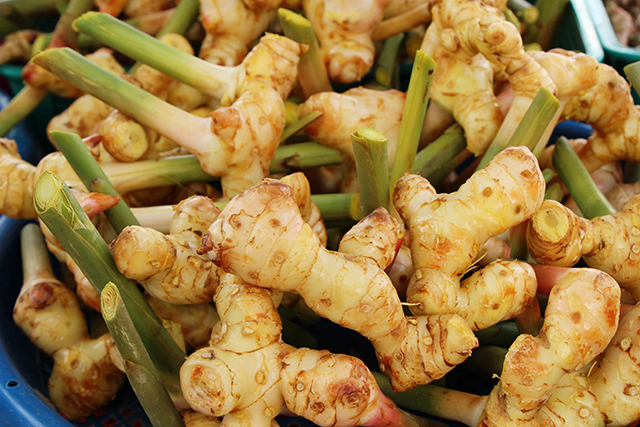Baicalin in Chinese skullcap found to suppress protein linked to skin cancer
05/26/2019 / By Evangelyn Rodriguez

Today, traditional Chinese medicine offers a wealth of natural alternatives that show efficacy in treating various diseases. Researchers continue to explore and uncover the potency of herbal remedies, which can be attributed to their abundance in beneficial chemical components. Scutellaria baicalensis or Chinese skullcap is one example of an herb that has numerous medicinal properties. It is rich in phytochemicals that can prevent or disrupt the progression of numerous diseases, including cancer.
In a recent study published in The American Journal of Chinese Medicine, researchers from two university-affiliated hospitals in China investigated the anti-tumor activity of baicalin, a bioactive component found in Chinese skullcap.
Baicalin has been the focus of many research due to its antitumor activity, but not much is known about the mechanisms that make it such a powerful anti-carcinogen in experimental studies. The Chinese researchers set out to understand its biological activity by testing it against one of the most common forms of skin cancer.
Squamous cell skin carcinoma is the second most common skin cancer that afflicts humans. According to the Skin Cancer Foundation, more than one million cases of squamous cell carcinoma are diagnosed in the U.S. each year. The root cause is said to be cumulative long-term exposure to ultraviolet radiation (UVR) from the sun. UVR directly affects the squamous cells, which form the outer layer of the epidermis. The epidermal layer or the topmost layer of your skin is your main defense against UVR and other harmful external factors. (Related: Want to prevent skin cancer? Eat more tomatoes … new science confirms powerful anti-cancer effect.)
The power of the elements: Discover Colloidal Silver Mouthwash with quality, natural ingredients like Sangre de Drago sap, black walnut hulls, menthol crystals and more. Zero artificial sweeteners, colors or alcohol. Learn more at the Health Ranger Store and help support this news site.
Baicalin regulates expression of nucleophosmin to inhibit tumor growth
In their previous study, the researchers reported baicalin’s ability to inhibit ultraviolet B (UVB)-induced photo-damage and apoptosis in HaCaT cells or human skin keratinocytes. But they also wanted to determine the cellular gene targets responsible for baicalin’s antitumor activity, so they conducted another experiment.
They first exposed HaCaT cells to UVB and baicalin before performing two-dimensional electrophoresis liquid chromatography-mass spectrometry/mass spectrometry (2-DE LC-MS/MS) to discover the cellular gene targets involved in baicalin’s anti-tumor activity. They also did 2-DE for protein separation, followed by matrix-assisted laser desorption/ionization mass spectrometry and database searches. In addition, they designed and synthesized nucleophosmin (NPM)-specific siRNA (small interfering RNA) and transfected it into skin squamous cancer A431 cells to knockdown NPM expression. They assessed proliferation and cell cycle status afterwards using CCK8 and flow cytometry, respectively.
For their results, the researchers identified 38 protein spots that were differentially expressed in HaCaT cells exposed to baicalin and/or UVB irradiation. These proteins were involved in different processes, such as detoxification, proliferation, metabolism, cytoskeleton, and cell motility. They also found several proteins that were linked to tumor progression and resistance, such as NPM. The researchers reported that baicalin treatment reduced the cellular proliferation rate of A431 cells and induced arrest during the S-phase of the cell cycle. They also noted that NPM1 silencing via transfection of their synthetic siRNA significantly enhanced the effect of baicalin.
Based on these results, the researchers concluded that baicalin exerts its anti-tumor activity on skin carcinoma by inhibiting tumor growth, which may be associated with the regulation of NPM gene expression.
Baicalin and its health benefits
Baicalin is a major bioactive component of Chinese skullcap, a flowering plant that has been found to exhibit antitumor activity. Baicalin is a flavone, a type of polyphenolic flavonoid or plant pigment that makes fruits and vegetables nutritious. Research on the bioactivity of baicalin has demonstrated several of its health benefits, which include:
- Anti-anxiety
- Neuroprotection
- Anticancer
- Hepatoprotection
- Anti-inflammatory
- Retinal protection
Despite this impressive list, there are some factors that limit baicalin’s application in medicine. One of these is its poor bioavailability. So far, studies have only tested baicalin on animals, and administration of baicalin has always been via injection. It is still unclear if baicalin can confer the same effects on humans that it does on animals. In addition, the mechanisms behind its anti-carcinogenic activity are not completely understood so further research needs to be done in order to fully utilize its potential.
Sources include:
Tagged Under: alternative medicine, anticancer, anticarcinogenic, antitumor, baicalin, cancer research, Chinese medicine, chinese skullcap, disease treatments, flavones, flavonoids, herbal medicine, Herbs, natural cures, natural medicine, Naturopathy, prevention, research, Scutellaria baicalensis, skin cancer, skin health, squamous cell carcinoma, TCM, UV radiation, UVB



















